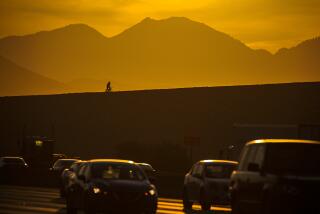Some say daylight saving is just a waste of time
- Share via
HARTFORD, CONN. — Who can argue about extending daylight saving time? You get more sunlight in your day and save energy too.
Author Michael Downing, however, takes issue with the energy premise -- a basis Congress cited for the extension.
Most of the nation will turn its clocks ahead at 2 a.m. Sunday, three weeks earlier than usual. In November, the fallback is a week later than last year.
The idea: Align daylight hours with the time that most people are awake and reduce the need for artificial light.
“That was theory,” Downing said. “It didn’t work.”
Human behavior gets in the way, he said. When the sun sets later, people do more outside the home. That usually means they get in the car and burn more gasoline, using as much energy in the long run as they would have if darkness had fallen earlier, said Downing, a Tufts University lecturer whose book “Spring Forward: The Annual Madness of Daylight Saving Time” was published in 2005.
“It has always been a beloved target for baseball and the golf and retail industries,” he said. “People shop more after work if there are extra daylight hours.”
And when people get home after a long day, they tend to stay up later, using as much electricity as they would if it got darker earlier, he said. In the morning, the kitchen lights come on and furnaces run earlier because it’s darker.
Downing’s views on the subject have engaged him in a media-induced debate with David Prerau, author of “Seize the Daylight: The Curious and Contentious Story of Daylight Saving Time,” also published in 2005.
Prerau helped write a study for the U.S. Department of Transportation in the 1970s that examined the extension of daylight saving time during the energy crisis. It found that the decision by Congress reduced electricity use.
“Most studies have shown it saves energy,” even taking into account increased gasoline use and other factors, Prerau said Friday.
The U.S. Department of Energy is remaining neutral. A department spokesman says decades-old data show that daylight saving time does save a little electricity. But the department intends to study the new extension.
More to Read
Sign up for Essential California
The most important California stories and recommendations in your inbox every morning.
You may occasionally receive promotional content from the Los Angeles Times.










